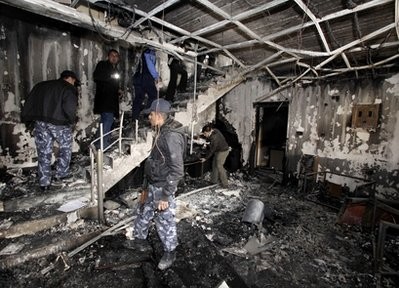A city that stands out in Iraq for its quality of life — the electricity works, the water's clean and there's even a bowling alley — has turned violent and tense in the past week as at least four protesters have been killed in marches against cronyism and corruption.
The clashes between security forces and demonstrators in Sulaimaniyah have revealed deep fissures that separate the Kurdish people and their leaders, denting the image of security and modernity that the city has enjoyed.

Supporters of the president and ruling parties blame the unrest on an upstart political group trying to elbow its way into power in this self-ruled region of Iraq. But that's not how many in the streets see it. They're fed up with government corruption and want the two ruling parties' lock on the area loosened.
"There is no justice in the Kurdistan region. Most of the politicians have accumulated huge wealth due to the corruption," said one of the protesters, 25-year-old Hindrin Jabar, an unemployed college graduate. "The government keeps giving false promises with no action."
In a country and a part of the world torn by deadly protests, what makes the Sulaimaniyah demonstrations stand out is that they've happened in an area that's been a rare bastion of quiet in Iraq.
The Kurds, who control a three-province autonomous region in northern Iraq, have prided themselves on being a peaceful, successful counterweight to the trouble-plagued areas of southern Iraq. After years of persecution, Kurdistan enjoyed de facto independence after the first Gulf War, allowing them to develop economically and politically.
Unlike many places in Iraq, the streets of Sulaimaniyah are clear of litter. Electricity works more than just a few hours a day, in contrast to Baghdad. In addition to the bowling alley, there's a modern mall with an escalator and a university that organizers describe as having an American-style liberal arts education.
City residents are worried by the sudden change in atmosphere.
"It looks like the situation during the 1991 uprising against Saddam. The city is flooded with security forces. I have not seen this amount of weapons inside Sulaimaniyah since 1991," said one protester, 52-year-old Sardar Muheialden.
Armored vehicles can be seen guarding the headquarters of the Kurdistan Democratic Party, headed by Kurdish President Massoud Barzani; the building was attacked by demonstrators last week. Two people were killed after security guards opened fire and daily protests have followed since.
The city's main streets are under close watch from Kurdish security forces. Food is being brought out to riot police, so they won't have to leave their posts. Residents report that young people trying to get into the city from the countryside are being stopped at checkpoints.
Many people say they are angry not just with Barzani's KDP, but also with the Patriotic Union of Kurdistan. Together, the two parties dominate the Kurdish political scene.
"Each of the two main parties has its own businesses and companies," said Khisro Qadir, a Kurdish businessman. "If we want to win a project in Kurdistan, we should accept a partner from the government or the two parties. Otherwise, deals will not be done."
The protesters have called for political reforms, an accounting of what happened during the shooting last week and some are demanding Barzani step down.
Ari Hasteen, a senior KDP official in Sulaimaniyah said his political party is unfairly being held responsible for all the problems in Kurdistan. He said the party agrees with many of the protesters' demands and calls for reforms but that riots are unacceptable.
A spokesman for Barzani denied that the two parties have somehow imposed their will on the rest of the region.
"The KDP and the PUK, along with several smaller parties, won the majority of votes in the 2009 general election held in the Kurdistan region," said Karim Zibari, referring to the vote for Kurdistan's parliament. "Allegations that only people affiliated with these two parties can secure decent jobs is nonsense."
A member of the PUK from Sulaimaniyah, Kader Hamajan, acknowledged that there is corruption in Kurdish politics — including his own party — but said it is not widespread and the majority of the members worked diligently.
Many in the KDP and PUK have blamed the protests on a relative newcomer to the political scene, a political party called Gorran — Change in Kurdish, a breakaway faction from PUK. A Gorran spokesman said his party is not driving the protests but it does sympathize with the marchers' frustrations.
The demonstrations have extended to small villages and towns outside of Sulaimaniyah. About 600 young people gathered for a rally in Halabja, 70 kilometers (43 miles) east of Sulaimaniyah, and set fire to some tires and threw stones at guards outside of a KDP office on Tuesday, according to police and the town's mayor. One demonstrator shot and killed a police officer, the town's mayor said. Thirteen people were later arrested.
But with the exception of a protest of about 500 students in the Kurdish capital, Irbil, the demonstrations have been limited to Sulaimaniyah province.
Leaders of the main political groups, including Gorran, met in Irbil late Monday but nothing was settled. Zibari said the session was expected to produce a joint statement encouraging all parties to calm the situation but that Gorran balked. Officials from Gorran said they demanded new elections for the Kurdish parliament but the PUK and KDP just wanted to put an end to the demonstrations.
Mohammed Tawfeeq, a spokesman for Gorran, said the other parties told his group "that if people go home they will start reforming. This is not true. No one believes them."
























